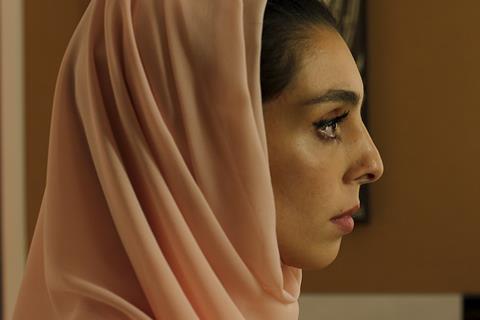Ulrich Seidl-produced drama shows how social media comes to dominate the life of a young Kurdish girl living in Vienna

Dir/scr: Kurdwin Ayub. Austria. 2022. 87mins.
Kurdwin Ayub’s vibrant feature is plugged directly into the modern Viennese diaspora, attempting to reframe the adolescent Muslim experience. Born in Iraq but now living in Austria, Ayub turns her own lived experiences into the wilfully chaotic story of a 17-year-old Kurdish girl in a Vienna housing estate who finds her already fractured religious and cultural identity put under increasing pressure when a video she makes with her (non-Muslim) friends goes viral.
Eschews traditional on-screen depictions of Muslim femininity and rebellion
Ayub is no stranger to the festival circuit with shorts including LOLOLOL and Boomerang and her feature documentary Paradise! Paradise!, and after Sonne - produced by Ulrich Seidl - makes its debut in Berlin’s Encounters strand, it will likely draw attention from other events particularly those involved in youth programming.
A Kurdish teen born in Vienna to Iraqi parents, Yesmin (Melina Benli) is initially depicted filming an iPhone video with her friends, “half Yugoslavian” Bella (Law Wallner) and native Austrian Nati (Maya Wopienka). They smoke, dance provocatively and sing along to REM’s 1991 hit ‘Losing My Religion’ — all dressed in Yesmin’s mother Awini’s (Awini Barwari) most precious hijabs. When the video inevitably gets uploaded to YouTube, audiences may assume they know where this story is going. But Sonne’s strength lies in its refusal to tow an obvious narrative line; while Awini is aghast, Yesmin’s father, Omar (Omar Ayub) revels in his daughter’s talent, and encourages the trio to perform at various Muslim community events.
With the reaction to the video being largely positive — the only backlash we witness being from two young male Kurdish patriots late in the film, who Yesmin firmly puts in their place — this is not a film particularly concerned with the traditional treatment of women who “dare” to be different. And while she may wear a headscarf out of deference to her Muslim heritage, neither Yesmin nor the film attach a great deal of significance to her faith. The acts of donning prayer robes or removing the headscarf are not moments of powerful drama, but of everyday, multi-cultural life.
Any conflicts here come from within. Yesmin — characterised by a blend of raw vulnerability and rebellious spirit by impressive newcomer Belini — at first revels in her independence, but soon finds herself questioning her brush with fame. As her friends co-opt elements of her culture, and put themselves and their dreams front and centre, Yesmin struggles to keep hold of her own, already fragile, sense of self. Her greatest challenge is to stop going with the flow, and determine what it is she actually wants.
Unlike many films of this ilk, Sonne deals less with faith and rebellion but the broader, more universal issue regarding the increasing dominance of social media in shaping the lives and identities of young people. Yesmin and her contemporaries are interesting, independent women but live their lives on their phones, using filters and careful editing to present carefully curated — and, by default, sexually attractive — versions of themselves.
Indeed, all of Sonne’s protagonists seem to be searching for a place to settle, and the film effectively captures this melting pot miasma. Cinematographer Enzo Brandner’s intimate hand-held camera combines with shaky mobile phone footage shrunk to far smaller portions; the suggestion is that these are lives continually framed by this black mirror, conforming to the expectations of an audience of judgemental strangers.
Elsewhere, Yesmin’s experiences as a typical school student, sitting through dry algebra and language lessons, is far removed from those of her mother, who struggles with a traumatic personal history that has left her in fear of losing her family’s meagre freedoms. In fact, one of the film’s most profound scenes comes when Awini shares those memories with her daughter; an emotional fusion of past and future that, despite Yesmin’s best efforts, is impossible to untangle.
Production company: Ulrich Seidl Filmproduktion
International sales: Cercamon, hello@cercamon.biz
Producer: Ulrich Seidl
Cinematography: Enzo Brandner
Production design: Julia Libiseller
Editing: Roland Stottinger
Main cast: Melina Benli, Law Wallner, Maya Wopienka, Kerim Dogan, Omar Ayub, Awini Barwari
























